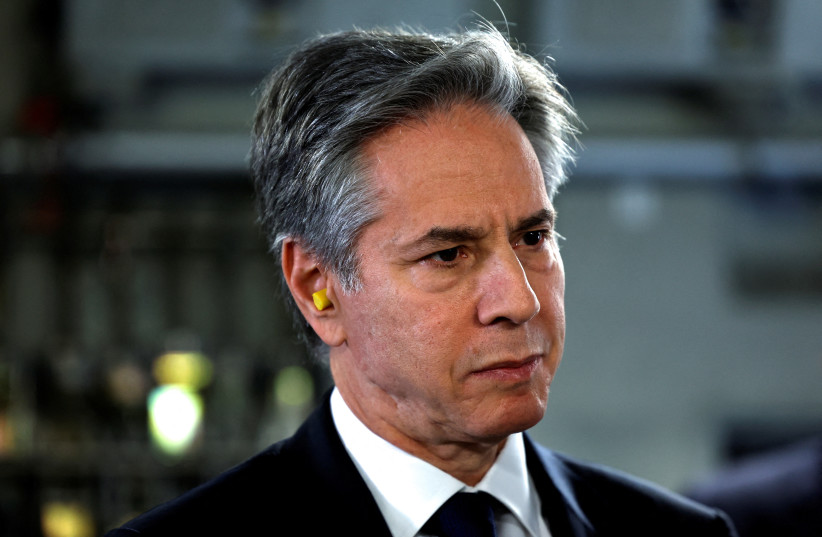Israel is willing to defy the United States on Rafah if it has to, Prime Minister Benjamin Netanyahu said as top Israeli officials are prepared to head to Washington this week to discuss the controversial military operation in southern Gaza.
“There is no way for us to defeat Hamas without going into Rafah and eliminating the rest of the battalions there,” Netanyahu said on Friday after he met with US Secretary of State Antony Blinken in Tel Aviv. Blinken made his sixth trip to the region since the start of the war.
The two men discussed the growing tension between their governments over the Rafah operation, which the US opposes and which Israel insists is the only way to win the war.
Netanyahu stood his ground in the conversation and told Blinken, “I hope we will do it with the support of the USA, but if we have to we will do it alone.”
Blinken pushed back at Netanyahu’s words in a brief conversation with reporters Friday while he was in Israel.
“We share Israel’s goal of defeating Hamas, which is responsible for the worst massacre of the Jewish people since the Holocaust,” Blinken said as he stood on the tarmac at Ben–Gurion International Airport.

"As we’ve said though, a major ground operation in Rafah is not the way to do it. It risks killing more civilians. It risks wreaking greater havoc with the provision of humanitarian assistance. It risks further isolating Israel around the world and jeopardizing its long-term security standing.”
He spoke about the issue with the war cabinet and is expected to hold further talks in Washington with the Israeli delegation led by Strategic Affairs Minister Ron Dermer and National Security Adviser Tzachi Hanegbi. He will also meet separately with Defense Minister Yoav Gallant who will also be in Washington, where he will also speak with US Secretary of Defense Lloyd Austin and US National Security Adviser Jake Sullivan.
“I will meet again with Israeli officials in Washington to discuss a different way we can achieve this objective,” Blinken stated.
In Tel Aviv, Netanyahu assured Blinken that he “greatly appreciates the fact that for more than five months we have been standing together in the war against Hamas.
“I also told him that we recognize the need to evacuate the civilian population from the war zones and of course also take care of the humanitarian needs and we are working to that end,” he said.
Blinken said he would meet Israeli officials in Washington “to talk about a different way of achieving these objectives, objectives that we share, of defeating Hamas and ensuring Israel’s long-term security.”
In Puerto Rico, US Vice President Kamala Harris said she didn’t believe it was possible to safely evacuate civilians from Rafah. “There is nowhere for those people to go and be safe,” she said.
At the White House US National Security Communications spokesperson John Kirby told reporters that he was not discouraged by Netanyahu’s comments that Israel would conduct a Rafah operation despite US objections.
“So we believe there’s time and space to have these discussions,” he stated.
Kirby maintained the purpose of the meeting was not for the US to tell Israel what to do.
US-Israel defense cooperation
“We want to make sure that they make those decisions fully informed with our lessons learned from urban warfare in this kind of fighting in places like Iraq and Afghanistan,” Kirby said. “Now, do they have to listen to our advice and counsel? No, but we have seen in the past where they have taken some of it on board. We hope they take this” advice, he said.
“We believe that a major ground offensive is a mistake” and would be a “disaster,” he explained, pointing to the over 1.3 million Palestinians in that area, many of whom had sought refuge there to escape bombings in the northern part of the enclave.
Kirby pushed back, however, at questions as to whether the Biden administration would halt military sales to Israel should its army head into Rafah over US objections. He stressed that the US would ensure that Israel could defend itself.
“We’re going to continue to approach this with Israel as we have in the past, which is to make sure that they have the tools they need to defend themselves against a still viable threat, while at the same time using the strength of the relationship between the United States and Israel,” Kirby said.
The White House has not yet seen a credible plan for the evacuation of Palestinian civilians from Rafah, Kirby said, adding that this would be part of the conversations US and Israeli officials would have this week in Washington.
Kirby did not comment on whether President Joe Biden would take part in those talks.
Rafah is only one of the topics of dispute between Jerusalem and Washington. The US has also taken issue with Israel’s handling of humanitarian assistance to Gaza, warning that the IDF has not done enough to prevent a hunger crisis in the enclave.
The Coordinator of Government Activities in the Territories said on Friday that seven million pounds of food had entered Gaza on Thursday. The two governments are also at odds over plans for Gaza once the war is over.
Gallant is expected to discuss these issues in Washington. According to his office, he will also speak about the “importance of maintaining and further deepening the important cooperation between the defense establishments of both countries, as well as topics related to force build-up and maintaining [Israel’s] qualitative military edge.”
